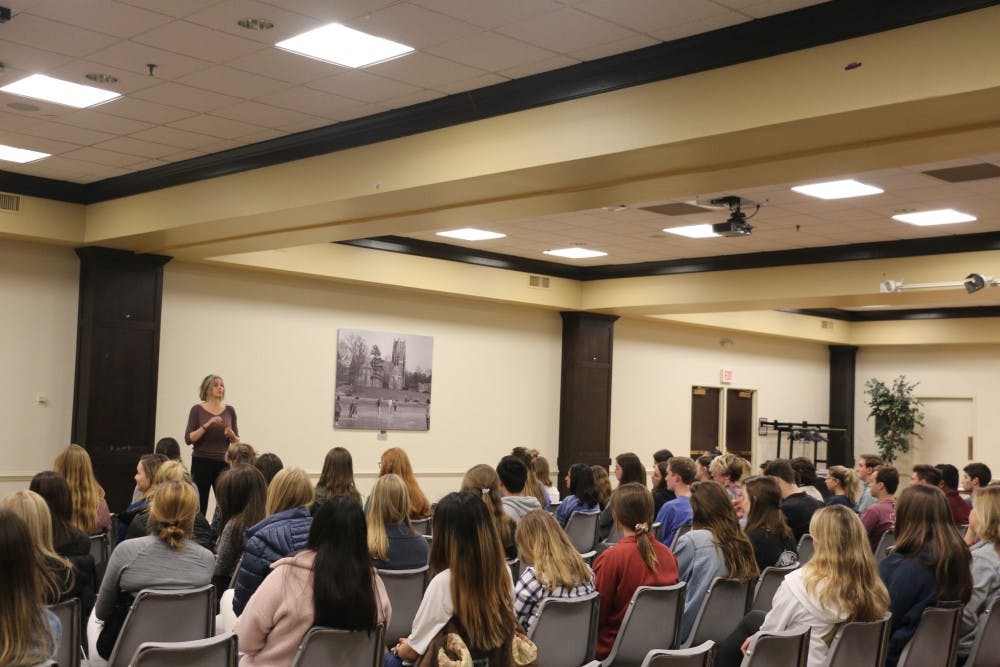We live in a confusing sexual culture because of social pressures around sex, a MogaDao Sacred Daoist sexuality teacher said to a group of University of Richmond students during her talk Tuesday.
In her talk entitled, "Redefining Sex on Campus," Sarah Byrden spoke about what is possible the moment after consent is given. The talk was held in Alice Haynes Commons and centered around the idea of talking about sex and what it means to have sex.
Byrden had worked with college students throughout her career, but when she was invited by a former student to give a lecture about sexuality at Colorado College in 2015, she realized that her background allowed her to speak about the unspoken culture of sex.
Since then, Byrden has spoken to students on college campuses about sex in an open, welcoming environment where their questions could be answered.
There is a voice in people’s heads saying that sex is bad, that we shouldn’t talk about it and that people should be curious about it, Byrden said.
This curiosity is especially important because many people feel as though they are not welcomed in their own sexual experiences, Byrden explained. She compared these experiences to swimming in a river upstream because most people do not understand what they are doing, or why.
She went on to explain the duality of the feminine and masculine roles that have been conditioned in our society. The masculine role should know what they’re doing all the time while the feminine is conditioned to not know, Byrden said.
As Byrden looked around the room and recognized the men, she said that it had been the most men she had ever seen at a campus talk. She said it was important for men to attend these talks because men have just as many questions as women, no matter their age. By showing up, they were already kicking over a cultural taboo, Byrden said.
“Sex is a conversation," she said. "At the root, that makes us nervous."
The dialogue that needs to happen should be surrounded by the idea that sex is something that is tremendously vulnerable and emotional because that is the way it is supposed to be, Byrden said.
This vulnerability is natural because what most people are missing during sex, Byrden said, is themselves.
“Sex is 10 percent mechanical and 90 percent you,” she said.
Enjoy what you're reading?
Signup for our newsletter
We don’t tell the truth about what’s happening in our bodies, Byrden said, stressing the importance of open communication and eye contact to fully understand what is happening.
Joella Allerton, LCSW, a fitness instructor and personal trainer who also teaches the wellness class, Sex, Lies and Communication, enjoyed the openness of Byrden’s talk.
"There was endless potential for people in the room to learn more about themselves and to be able to communicate that and teach it to other people," Allerton said.
The lessons that are learned through talks such as Byrden's can help contribute to the change of the culture that we live in, Allerton said.
Anna Lowenthal, a junior and student-worker at the center for sexual misconduct prevention and response, appreciated how Byrden presented sexual experiences in a positive manner.
“There was more programming about what can be done and what should be done, rather than what shouldn’t be done or what can’t be done," Lowenthal said.
Cat Sciolla, senior, who is also a student-worker at the center for sexual misconduct prevention and response, agreed with Lowenthal, saying that the talk was refreshingly explicit because Byrden actually talked about topics that UR students wanted to hear instead of dancing around them.
Byrden also hosted a workshop in the Tyler Haynes Commons on Feb. 28.
Contact sports editor Lindsay Emery at lindsay.emery@richmond.edu.
Support independent student media
You can make a tax-deductible donation by clicking the button below, which takes you to our secure PayPal account. The page is set up to receive contributions in whatever amount you designate. We look forward to using the money we raise to further our mission of providing honest and accurate information to students, faculty, staff, alumni and others in the general public.
Donate Now



